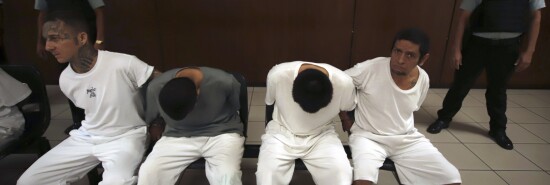
El Salvador just learned that incarceration works
Washington Examiner
Video Embed
The immigration crisis at the border is partly a result of gang violence in Latin America. At one point, El Salvador had become so lawless that a large percentage of its population fled in fear of extortion and death at the hands of El Salvador’s brutal street gangs, MS-13 and Barrio 18.
But in case you haven’t been paying attention to the news from El Salvador, the country has been completely transformed in the last year.
BIDEN MUST LET SENATE DO ITS JOB ON CLASSIFIED DOCUMENTS
When Salvadoran President Nayib Bukele came to power in 2019, the nation’s homicide rate had already been declining from its shocking high of 2015 — 103 murders per 100,000 population, by far the worst on earth. In 2019, that was down to 36 per 100,000 — still very high but less intolerable. As that rate came down further, the United States accused Bukele of making a truce with the gangs, which he denied.
But if he did anything of the sort, it appears that he has definitely gotten the better of them now.
Beginning last March, Bukele launched a massive crackdown on gangs, more than doubling the tiny nation’s prison population in the process. The result? The homicide rate in El Salvador has plunged to new lows. Murders last year (496) were down 57% from the year prior to a rate of 7.8 per 100,000. Washington, D.C.’s rate of 28.5 murders per 100,000 is far worse.
It hasn’t been pretty how they got there. Bukele, a centrist businessman who came from neither El Salvador’s rightist nor leftist political traditions, has been attacked by human rights groups for the brutality of his anti-gang campaign, the treatment of prisoners, and allegations that innocent people are being swept up with the guilty and charged either with gang membership or collaboration with gangs. But El Salvador’s crackdown is insanely popular inside the country. It has given Bukele a nearly 90% approval rating. Nearly everyone inside El Salvador supports the crackdown because it has transformed that nation from a crime-ridden, violent hellscape into a livable place.
The crackdown was swift, immense, and — we will not sugarcoat it — clearly unethical. It began with an emergency law suspending defendants’ right to legal counsel and extending the period of time that defendants could be held without charges. Gang collaborators as young as 12 could receive criminal charges, with gang-affiliation sentences dramatically increased.
With new powers to enforce and search suspected gang members and monitor their communications, the army mobilized to take back neighborhoods across El Salvador. In all, 60,000 have been arrested on suspicion of gang activity. Whereas in the past, gang leaders would face sentences of less than 10 years, gang affiliation now earns up to 30 years and up to 45 years if you’re a gang lord. Those caught passing messages for the gangs face 10 to 15 years — even members of the media. Gang members inside prison have been cut off entirely from the outside world so that they cannot continue to call the shots. They are also reportedly confined to their cells for 24 hours a day and housed with hundreds of other inmates, some from rival gangs.
Meanwhile, outside the prison walls, a miracle is happening. A nation is being transformed into a place people no longer need to flee for fear of their lives. It is the gang members who are afraid now — afraid that their neighbors will turn them in the next time they do their usual raping and extorting.
Even if Bukele’s gang crackdown is flawed and excessively brutal, it has proven with scientific precision one lesson that some American authorities have forgotten in their own fight against crime: incarceration works.
Yes, that’s right — putting lots of very bad criminals behind bars is a necessary part of any effective strategy against rising crime in the U.S.
El Salvador’s street gangs used to be a constant presence, extorting businesses and menacing civilians, even murdering innocent people for walking down the wrong street. Then, they started ruthlessly arresting and prosecuting that small percentage of the population that commits nearly all of the violent crime, and voila. It turns out that if you put criminals in jail, they can’t commit crimes on the outside. Who would have thought?
No one wants the U.S. to do what El Salvador is doing now. No one wants to see such abuses imported back into the U.S. Fortunately, no such is necessary in the U.S., where the rule of law is much more firmly established. All that is needed is for prosecutors to start doing their jobs.
Criminal justice reforms, at their best, are based on the notion that nonviolent first-time offenders often merit leniency. Some can even better repay their debts to society and their victims through so-called “restorative justice.” That is all fine as far as it goes.
But there is no sane version of reform that involves coddling repeat and violent offenders the way many liberal district attorneys, particularly those backed by George Soros, have been doing in several major U.S. cities. They have turned their jail doors into revolving doors, and — surprise, surprise — the criminals keep creating new victims.
CLICK HERE TO READ MORE FROM THE WASHINGTON EXAMINER
This cannot be said enough: Violent and career criminals are not victims of an unjust system. They are not like Aladdin, stealing bread to feed their impoverished families. Rather, they are aggressors, predators. Opportunists. They oppress and harm their fellow citizens and ruin lives. Although their rehabilitation would be preferable, rehabilitation is their choice. In the meantime, it is not an injustice when such criminals are locked away for everyone else’s protection.
All the U.S. needs to solve its current crime problem is for its many prosecutors to relearn that incarceration works and that criminals are not victims.
